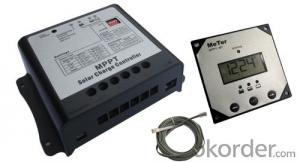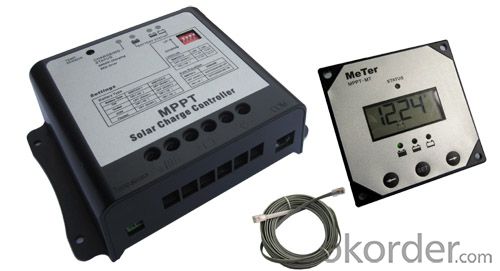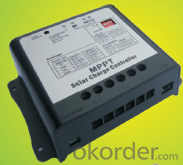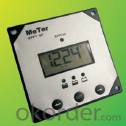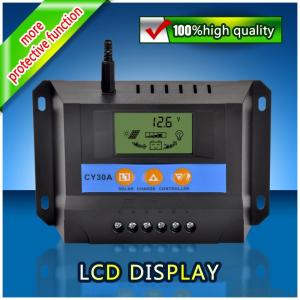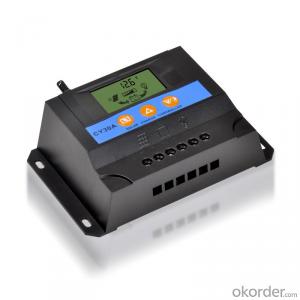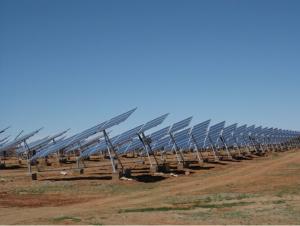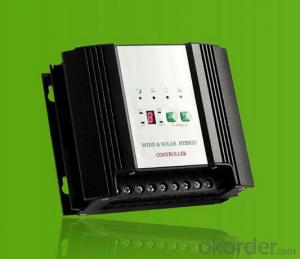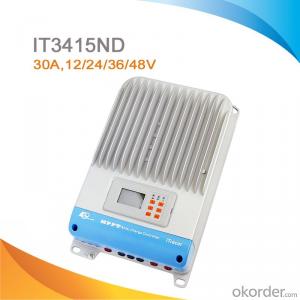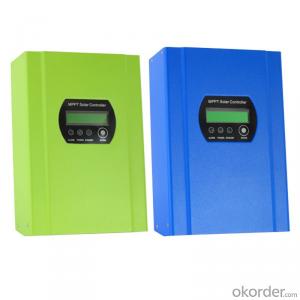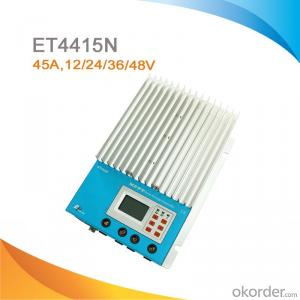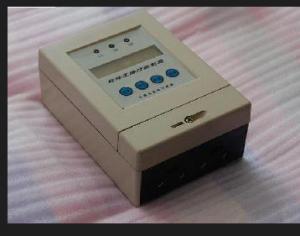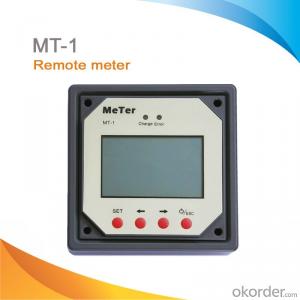1052971982 Solar Controllers - MPPT Solar Charge Controller + 4-Stage Charging + Remote Meter (Options)
- Loading Port:
- Shekou
- Payment Terms:
- TT OR LC
- Min Order Qty:
- 100 unit
- Supply Capability:
- 100000 unit/month
OKorder Service Pledge
OKorder Financial Service
You Might Also Like
1 The solar charge controllers with MPPT (Maximum Power Point Tracking technology)
2.Than PWM charge controller can improve the charging efficiency of 30%
3.12V/24V system Automatic detection
4. four-stage charge mode
5. solar panels open-circuit voltage: 75V
6. External LCD display, real-time display of the various parameters of the controller, and the fault code
7. Full electronic protection, with low voltage protection, overcharge protection, automatically restore the connection, anti-reverse feature
8. PCB board with waterproofing
Technical data
MODEL | MPPT7510 | MPPT7515 | |
| System voltage | 12V/24V Automatic detection | ||
| Rated battery current | 10A | 15A | |
| PV max. input voltage | 75V | ||
| PV max. input power | 12V system:150W 24V system:300W | 12V system: 200W | |
| Self-consumption | <35ma< td=""> | ||
Meter connection | RJ45 (8-PIN) | ||
| Battert voltage range | 7V-36V | ||
| Temp. conpensation range | -5mV/ ℃/cell | ||
| Low-voltage disconnect | 11.5V /11V (option): 24V system:×2 | ||
| Regulation method | 4-stage charge mode | ||
| Low-voltage reconnect | 12.5V ; 24V system:×2 | ||
| Operating Temperature | -40℃--60℃ | ||
| Dimensions | 152 ×113×47mm | ||
| Weight | 0.6kg | ||
- Q: Can a solar controller be used with different types of solar panel cleaning systems?
- Different types of solar panel cleaning systems can be used with a solar controller. The solar controller is responsible for regulating and optimizing the charging and discharging of batteries in a solar power system. Its purpose is to ensure efficient and safe charging of batteries by controlling the flow of electricity from the solar panels. The functioning of the solar controller is not directly affected by the type of solar panel cleaning system used. Its main role is to manage the flow of electricity, and it does not have any specific compatibility requirements with different cleaning systems. However, it is important to consider the compatibility of the solar controller with the overall solar power system and the specific cleaning system being used. The controller should be capable of handling the voltage and current requirements of both the solar panels and the cleaning system. It is advisable to refer to the manufacturer's specifications and guidelines to ensure that the solar controller is suitable for the specific cleaning system being utilized.
- Q: How does a solar controller handle temperature compensation for the battery?
- A solar controller handles temperature compensation for the battery by adjusting the charging voltage based on the battery's temperature. The controller monitors the battery's temperature and compares it to a predetermined temperature compensation curve. This curve determines the appropriate charging voltage for the battery at different temperature levels. When the battery is cold, the controller increases the charging voltage to ensure efficient charging and prevent undercharging. In cold temperatures, the battery's internal resistance increases, which can lead to a drop in charging efficiency. By increasing the charging voltage, the controller compensates for this increase in resistance and provides the necessary energy to fully charge the battery. On the other hand, when the battery is hot, the controller reduces the charging voltage to prevent overcharging. High temperatures can accelerate the battery's chemical reactions, leading to increased gassing and loss of electrolyte. By lowering the charging voltage, the controller prevents overcharging, which not only prolongs the battery's lifespan but also ensures its safety. Overall, the temperature compensation feature of a solar controller optimizes the charging process by adjusting the charging voltage to match the battery's temperature. This helps maintain the battery's performance, prolong its lifespan, and ensure efficient and safe charging.
- Q: Can a solar controller be used with solar-powered electric vehicle chargers?
- Solar-powered electric vehicle chargers can indeed utilize a solar controller. Acting as a regulating device, a solar controller manages the electricity flow from solar panels to charging systems or batteries. Its primary objective is to ensure the charging efficiency remains high while safeguarding the battery against detrimental overcharging or any potential damage. Specifically concerning solar-powered electric vehicle chargers, a solar controller serves to govern the charging procedure and optimize the utilization of solar energy. It achieves this by controlling the charging speed and preserving the battery's overall health. With the aid of a solar controller, the charging system effectively harnesses solar power, providing a dependable and sustainable solution for electric vehicle charging.
- Q: Can a solar controller increase the efficiency of a solar panel?
- Yes, a solar controller can increase the efficiency of a solar panel. A solar controller, also known as a charge controller, is an essential component in solar power systems that helps regulate the flow of electricity between the solar panel and the battery bank. One of the main functions of a solar controller is to prevent overcharging or over-discharging of the batteries. By monitoring the voltage and current levels, it ensures that the batteries are charged optimally and not damaged by excessive voltage or discharged beyond their safe levels. This prevents energy wastage and prolongs the lifespan of the batteries, indirectly increasing the overall efficiency of the system. Moreover, some advanced solar controllers also incorporate Maximum Power Point Tracking (MPPT) technology. MPPT controllers use algorithms to continually track and adjust the electrical load on the solar panel to extract the maximum power output, regardless of the temperature or shading conditions. This enables the solar panel to operate at its peak efficiency, even in less than ideal conditions, resulting in higher energy production. In summary, a solar controller plays a crucial role in optimizing the performance of a solar panel system by preventing battery damage and maximizing power output. By regulating and maximizing the charging process, it can significantly increase the efficiency of a solar panel.
- Q: Can a solar controller be used with solar trackers?
- Yes, a solar controller can be used with solar trackers. A solar controller is typically used to regulate and optimize the charging of batteries in a solar power system. It monitors the voltage and current from the solar panels and ensures that the batteries are charged efficiently and safely. Solar trackers, on the other hand, are devices that follow the movement of the sun throughout the day, maximizing the solar energy output by keeping the solar panels aligned with the sun's position. They use motors or actuators to adjust the orientation of the solar panels. While solar controllers and solar trackers serve different functions, they can be used together in a solar power system. The solar controller will be connected to the solar panels and batteries to manage the charging process, while the solar tracker will adjust the position of the panels to capture the maximum amount of sunlight. By combining both technologies, the solar power system can benefit from increased energy generation and improved battery charging efficiency. This can lead to higher overall system performance and increased energy output.
- Q: Can a solar controller be used in a solar-powered electric go-kart system?
- Yes, a solar controller can be used in a solar-powered electric go-kart system. A solar controller is responsible for regulating the flow of electricity from the solar panels to the batteries, ensuring that the batteries are charged efficiently and preventing overcharging. In a solar-powered electric go-kart system, the solar controller would play a crucial role in managing the charging process and optimizing the use of solar energy to power the go-kart.
- Q: How do you connect solar panels to a solar controller?
- To connect solar panels to a solar controller, you will typically need to connect the positive (+) and negative (-) leads of the solar panels to the corresponding terminals on the solar controller. This is usually done by using appropriate wires or cables and ensuring a secure connection. It is important to follow the specific instructions provided by the manufacturer of your solar panels and solar controller to ensure proper and safe installation.
- Q: What is the power of the solar controller?
- If you are 12V system, select the 10A controller, then the controller with the power of 12V × 10A = 120W, up to the battery with no more than 150W.
- Q: How do you prevent overheating of a solar controller?
- There are several ways to prevent overheating of a solar controller. First, ensure that the controller is installed in a well-ventilated area away from direct sunlight. Adequate airflow around the controller helps dissipate heat. Secondly, avoid overloading the controller by not exceeding its maximum rated capacity. This can cause excessive heat generation. Lastly, regularly inspect and maintain the controller to ensure that it is free from dust, dirt, or any obstructions that may hinder proper heat dissipation.
- Q: Can a solar controller be used in a solar-powered cargo ship?
- Yes, a solar controller can be used in a solar-powered cargo ship. A solar controller is responsible for regulating and optimizing the energy flow from solar panels to the ship's battery bank. It ensures that the solar panels are charging the batteries efficiently and protects them from overcharging. Therefore, a solar controller plays a crucial role in maximizing the solar power generation and utilization in a solar-powered cargo ship.
Send your message to us
1052971982 Solar Controllers - MPPT Solar Charge Controller + 4-Stage Charging + Remote Meter (Options)
- Loading Port:
- Shekou
- Payment Terms:
- TT OR LC
- Min Order Qty:
- 100 unit
- Supply Capability:
- 100000 unit/month
OKorder Service Pledge
OKorder Financial Service
Similar products
Hot products
Hot Searches
Related keywords
